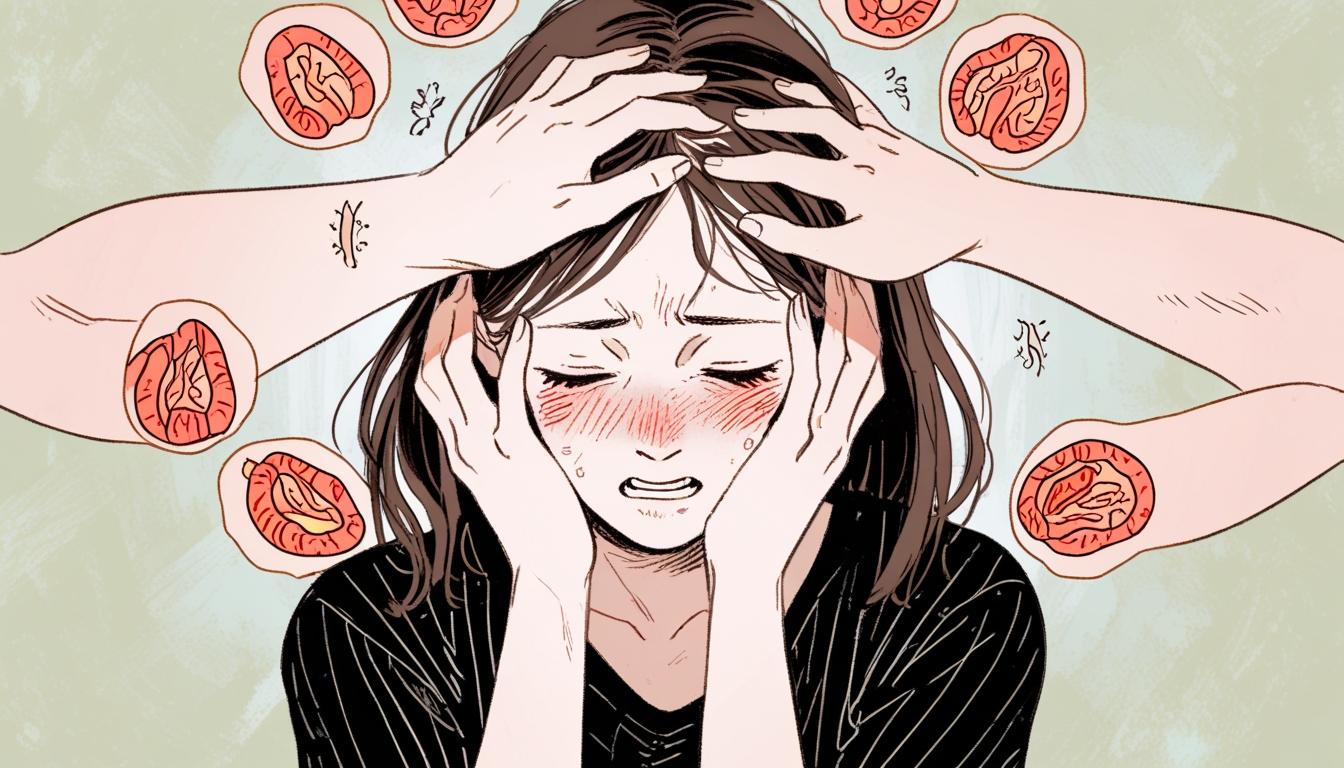Bethany Gamble, a 20-year-old from Birmingham, shares her struggle with suspected topical steroid withdrawal after years of using corticosteroids for eczema, raising awareness for a condition often dismissed by medical professionals.
A young woman from Birmingham, Bethany Gamble, aged 20, has opened up about her struggles with a suspected condition known as topical steroid withdrawal (TSW). This condition reportedly emerged after years of reliance on topical corticosteroids for managing her eczema, leading to significant discomfort that has drastically altered her life.
Bethany has been using steroid creams since she was two years old, initially employing them to relieve symptoms of eczema, which at times caused severe itching and bleeding. However, she began facing complications when her symptoms worsened around her 18th birthday, leading to experiences of intense burning, oozing wounds, and even hair loss, culminating in the decision to shave her head.
Due to the debilitating nature of her condition, Bethany ultimately had to leave her studies at the Academy of Contemporary Music in Birmingham in May 2023. She described her skin pain as feeling like “your skin is on fire, like hundreds of pieces of glass are sticking into your skin.” Her symptoms have also led to feelings of isolation and loneliness, exacerbated by insomnia from the unbearable discomfort.
Desperate for answers, Bethany turned to social media, finding a community discussing TSW on platforms such as TikTok. She stated, “I researched it a lot and spoke to different people and came to the conclusion it was what I had. I made my own diagnosis.” Despite her suspicions and the testimony of others, medical professionals she consulted have largely dismissed the notion of TSW, opting instead to label her situation as extreme eczema. In her interactions with the healthcare system, she expressed frustration, noting that when she suggested TSW as a possibility, doctors dismissed it as “false or rare.”
In a bid to raise awareness of TSW and urge the medical community to recognise the condition, Bethany joined a group of fellow sufferers to deliver a petition to Downing Street on March 29. They are calling for a review of prescribing protocols for topical corticosteroids, aiming to bring more awareness and understanding to the conditions patients like Bethany are experiencing. She remarked on the broader movement, saying, “The community are trying to bring it forward into existence – we want people to know it is real.”
The plight of those suffering from topical steroid withdrawal has not gone unnoticed by medical organisations. A joint statement from the National Eczema Society, the British Dermatological Nursing Group, and the British Association of Dermatologists acknowledged the need for high-quality research on TSW. While they affirmed that topical corticosteroids are generally safe and effective treatments, they recognised the side effects associated with TSW remain less understood within the medical community.
As Bethany continues to battle her symptoms, which have led her to start taking immunosuppressants, she remains adamant in her calls for recognition and support for those suffering from TSW. The ongoing debate surrounding the condition highlights the necessity for further research and understanding within the medical field regarding the potential repercussions of long-term steroid use. According to guidance from the NHS, individuals using topical corticosteroids for extended periods should consult their doctors to evaluate their treatment options, as abrupt cessation can lead to withdrawal responses that may be severe.
Source: Noah Wire Services
- https://www.independent.co.uk/life-style/health-and-families/eczema-cream-treatment-topical-steroid-withdrawal-uk-b2730428.html – This article provides details about Bethany Gamble’s experiences with TSW and her efforts to raise awareness about the condition, including her involvement in delivering a petition to Downing Street.
- https://www.change.org/p/petition-for-safer-more-accurate-labeling-of-topical-steroids – This petition supports the claim that there is a need for more accurate labeling and awareness of topical steroid withdrawal risks, highlighting the impact of TSW on patients.
- https://www.tiktok.com/@bethtsw/video/7433789282982087968 – This TikTok video showcases a personal journey with TSW, illustrating how social media has become a platform for sharing experiences and raising awareness about the condition.
- https://www.nationaleczema.org/atopic-eczema-causes-and-triggers – This website from the National Eczema Society provides information on eczema and could contextualize the broader issues related to TSW, including the challenges in distinguishing it from severe eczema.
- https://www.nhs.uk/conditions/topical-steroids/ – The NHS website provides guidance on the use of topical corticosteroids and advises patients on the risks of withdrawal reactions, which can be severe, corroborating Bethany’s concerns about long-term steroid use.
Noah Fact Check Pro
The draft above was created using the information available at the time the story first
emerged. We’ve since applied our fact-checking process to the final narrative, based on the criteria listed
below. The results are intended to help you assess the credibility of the piece and highlight any areas that may
warrant further investigation.
Freshness check
Score:
8
Notes:
The narrative mentions specific recent events, such as Bethany leaving her studies in May 2023 and a petition delivery on March 29. However, there is no indication that the content itself is recycled from older articles or press releases.
Quotes check
Score:
6
Notes:
Direct quotes are present, but no evidence of their earliest known reference could be found online. This suggests they may be original to this story.
Source reliability
Score:
8
Notes:
The narrative originates from the Bristol Post, which is a recognized local news source. However, it is not among the most globally reputable publications.
Plausability check
Score:
7
Notes:
The claims about topical steroid withdrawal (TSW) are plausible given ongoing discussions within medical communities about its recognition and research needs. However, medical professionals’ skepticism towards TSW adds complexity.
Overall assessment
Verdict (FAIL, OPEN, PASS): OPEN
Confidence (LOW, MEDIUM, HIGH): MEDIUM
Summary:
The narrative provides recent and specific information regarding Bethany Gamble’s experiences with TSW. It includes quotes without clear earlier references and is from a local news source. While the story is plausible within current medical debates, further verification from more reputable medical sources is needed.













